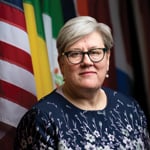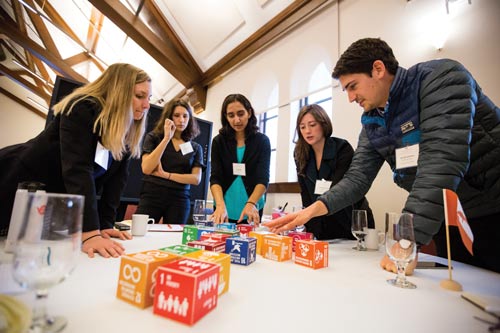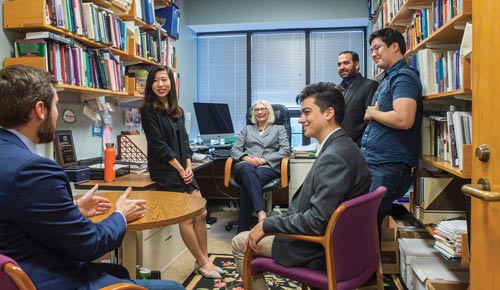2020 Leaders in Graduate Education
THIS GUIDE IS NO LONGER ACTIVE. For the current FP Guide, click here.
Rachel Kyte, Dean
Tufts University, The Fletcher School
“Young people—they see the world differently,” says Rachel Kyte, about what first inspired her to shift gears professionally and become the 14th dean of The Fletcher School at Tufts University and the first woman to hold the position since the school’s founding in 1933.
Kyte was working as the CEO of a United Nations clean-energy initiative and a special representative of the UN Secretary-General when she began considering the next steps in her global career. Her previous experience included serving as a World Bank Group vice president and special envoy on climate change.

“Wherever you are in your career, wherever you are in your life, we will be the place you can turn to, to get greater understanding. Fletcher is your friend for life, in comprehending and contributing to this world.” –Rachel Kyte, Dean, The Fletcher School, Tufts University
Kyte also had been helping guide master’s and PhD students at The Fletcher School, analyzing global climate negotiations and advising them in their studies and career plans, as a professor of practice at Fletcher’s Center for International Environment and Resource Policy. She often recruited these bright, innovative students to serve as interns at the UN.
 These students’ enthusiasm and entrepreneurship, and their determination to build a better global future, drew Kyte to the job of dean. After assuming the role in the fall of 2019, Kyte spent her early weeks on the job meeting with faculty, students, alumni, the board, and the larger Tufts family to hear their ideas. This input contributed to her vision for building on the school’s strengths and its reputation for setting the bar in preparing future leaders for the enormity of the global challenges they will face.
These students’ enthusiasm and entrepreneurship, and their determination to build a better global future, drew Kyte to the job of dean. After assuming the role in the fall of 2019, Kyte spent her early weeks on the job meeting with faculty, students, alumni, the board, and the larger Tufts family to hear their ideas. This input contributed to her vision for building on the school’s strengths and its reputation for setting the bar in preparing future leaders for the enormity of the global challenges they will face.
As an example, consider Kyte’s area of expertise: climate issues. The Fletcher School looks at climate change not only in terms of traditional impacts on oceans and agriculture, but also in terms of how it affects security, tactics on the battlefield, economies and business, or migration flows.
That combination of complexity and the global nature of the biggest issues facing today’s world was another motivator for Kyte to take the helm of The Fletcher School, she says. She aims for the school to teach climate change as a “threat intensifier across the full range of international relations.”
 One distinguishing feature of Fletcher is that it has no strict core curriculum, but rather provides “a highly customizable curriculum across more than 20 fields of study,” the new dean explains. She cites the “constellation of faculty and teaching” focused on fields such as gender and conflict, human security related to migration and refugee issues, international law, development economics, and international politics.
One distinguishing feature of Fletcher is that it has no strict core curriculum, but rather provides “a highly customizable curriculum across more than 20 fields of study,” the new dean explains. She cites the “constellation of faculty and teaching” focused on fields such as gender and conflict, human security related to migration and refugee issues, international law, development economics, and international politics.
“The interdisciplinary nature of Fletcher matches the intersectional nature of the world as we see it today,” Kyte says, adding that employers have noted that the school’s graduates possess a holistic view of the world and the challenges its citizens must confront.
Kyte sees the school’s location in Boston as a virtue for international affairs students, offering an extraordinary academic environment and a vibrant economy in finance, biotechnology, and health, with an innovative, start-up culture.
The new dean also aims to extend the progress The Fletcher School has made in the past decade in diversifying its faculty.
“The faculty and the student body need to reflect the world we live in and the very different perspectives that come from that diversity,” she says.
Graduate Degree Program Options
Two-year degrees:
- MA in Law and Diplomacy
- Master of International Business
- MA in Transatlantic Affairs
One-year degrees:
- Master of Arts (mid-career)
- Master of Laws in International Law
- Global Master of Arts (mid-career)
- Master of Global Business Administration (mid-career)
- MA in Humanitarian Assistance
- MS in Cybersecurity and Public Policy
> - PhD in International Relations
- Joint PhD in Economics and Public Policy
The school offers additional dual and joint degree programs.
Visit the Request Info page to receive more information.
Contents
- 2020 Leaders in Graduate Education
- Johns Hopkins School of Advanced International Studies
- UC San Diego, School of Global Policy and Strategy
- Indiana University, Hamilton Lugar School of Global and International Studies
- NYU School of Professional Studies, Center for Global Affairs
- Tufts University, The Fletcher School
- University of Kent, Brussels School of International Studies
- Columbia University, School of International and Public Affairs (SIPA)
- University of Texas at Austin, LBJ School of Public Affairs

